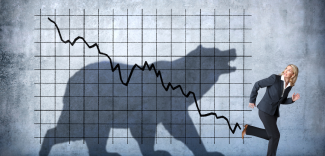
What Is a Bear Market and What Should I Do Now?
The idea of a bear market may be new to many of you. To the average investor, a bear market can be alarming. But what is a bear market? What are the disadvantages and advantages for you? These are questions we've been asked recently, so here's a basic definition and a few key takeaways for you to consider.
What is a bear market?
A bear market is defined as a market experiencing a prolonged period where investment prices fall at least 20% or more from their recent high, usually in reference to the movement of one of the major indexes: the S&P 500, Dow Jones Industrial Average, or Nasdaq. A bull market is the mirror image representing an increase of at least 20% from market lows.
Many things can lead to a bear market, including a weak or slowing economy, wars, bursting market bubbles, pandemics, geopolitical crises, and tax increases. Simply put, when investors' confidence falls, they begin "selling off" shares which lower stock market prices. The momentum of this action can often perpetuate itself, further driving the decline.
Not all stocks are created equal.
Different sectors of the market will react differently during a bear market. Some parts of the market are down more significantly than the 20%. If you have more aggressive holdings or more technology-heavy things, some of those spaces are down 30-60%.
On the flip side, other parts of the market are holding up better. In some instances, like the energy sector, holdings are currently favorable for the year. Many factors factor into a specific industry's performance, so there can be an opportunity. It's always best to review your portfolio with your financial advisor to ensure your goals are still being met.
Avoid knee-jerk reactions.
Downward trends in the stock market are part of the natural ebb and flow of the market. Don't make rash decisions when it comes to a bear market. We've historically had dozens and dozens of bear markets. Deciding how to invest based solely on what has happened in the last six months is usually not a wise course of action.
It can be wise to look at your space right now and maybe make some tweaks. Things that may have worked in the past may not work for you in the same ways today. Everyone's space is different, but it may be a good idea to evaluate your space and take advantage of some opportunities in front of you.
Conclusion
Just like you wouldn't welcome a grizzly into your home, a bear market is generally not welcomed with open arms. However, they are an unavoidable part of the financial landscape. Remember, don't panic. Use this as an opportunity to review your portfolio with a financial advisor and possibly make some tweaks if needed. You want to look at the short and long term and make the best decisions for your economic space.
If you have questions about the stock market or your financial space, call us at (412) 928-8801 or visit us at www.oakwoodfinancialgroup.com. If you wish to schedule an introductory meeting, we will happily meet with you at no cost or obligation.
These Blogs are provided for informational purposes only and should not be construed as investment advice. Any opinions or forecasts contained herein reflect the subjective judgments and assumptions of the authors only and do not necessarily reflect the views of SagePoint Financial.

